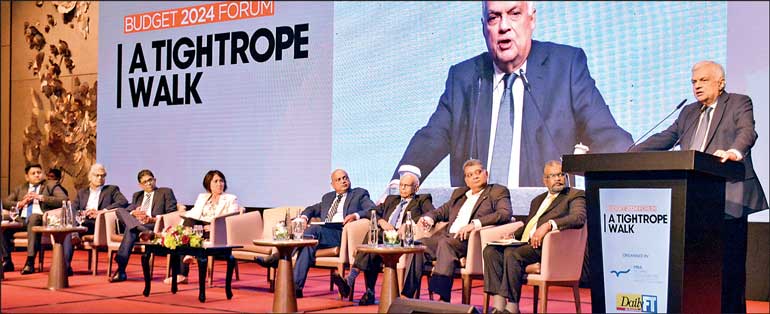Wednesday Feb 18, 2026
Wednesday Feb 18, 2026
Thursday, 16 November 2023 00:00 - - {{hitsCtrl.values.hits}}

By Charumini de Silva
President Ranil Wickremesinghe yesterday gave a pragmatic perspective of the dynamic nature of the 2024 Budget, stressing its task as a flexible framework for the future rather than rigid estimates.
Delivering the keynote address at the annual post-Budget forum jointly organised by the Daily FT and the University of Colombo MBA Alumni Association with strategic partnership of the standard Chartered Bank, he expressed a pragmatic outlook, recognising the need for change influenced by externalities. He also highlighted the importance of unpopular decisions in steering the country toward growth with the support of the private sector describing it a ‘national effort’.
“We thought the crisis was too big for us to deal with one Budget and you can’t. You have to make changes as we move along and that is the direction we are going,” he added.
Wickremesinghe presented a broader perspective on the Budget, drawing inspiration from US President Franklin D. Roosevelt, insisting the need for a comprehensive strategy beyond a traditional Budget to shaping the country’s economic landscape.
He acknowledged the challenges in implementation whilst emphasising the necessity of making difficult yet unpopular decisions for the greater good.
Referring to this year’s forum title ‘A tightrope walk’ he said: “This is called a tightrope walk, but I don’t know if I am a tightrope walker. I feel more like a trapeze artist as do the rest of the team members – that’s what we’ve been doing.”
The President adopted a broader perspective, considering external factors, particularly the situation in the Middle East, noting that the image of the Budget could change, mainly subject to developments in the region. “We are keeping our fingers crossed that there’ll be a ceasefire in Gaza, making it easier for the people of Gaza and the rest of us,” he added.
Addressing ongoing debt restructuring negotiations, the President revealed that the country is in the final stages of bilateral talks, having received responses from various stakeholders, including China.
He anticipated positive results by December, indicating that such agreements could influence better future Budgets.
“There’s nothing called a free lunch. We have to realise that we have to live within our means whether it is this Government or the next Government. No matter how difficult it is, we have to make unpopular decisions for the greater good,” he added.
Highlighting the economic vision embedded in the Budget proposals, Wickremesinghe stated that the goal extends beyond stabilising the economy to a transformative agenda to build a new economy, signifying a commitment to comprehensive and long-term economic development.
Agriculture modernisation, fisheries, dairy, tourism, and export-led manufacturing were identified as priority development areas; along with increased investment in renewable energy and universities.
In terms of plans to allocate 20% of shares from two major State banks to strategic investors for future growth, he clarified that 60% would be retained in the holding company during privatisation, with considerations for employee participation and a special provision for depositors to purchase shares.
“I am not too worried about getting investors because I’m looking at big accounts not in Colombo or the City office, but in Kekirawa, Welikanda and other places. We aim to expand ownership to make people the stakeholders and enable them all to come into the stock exchange,” he expressed confidence.
The President also highlighted the need for a shift in direction, stating that stabilising and achieving debt sustainability is possible despite challenges in trade balance and budget deficits in the long run.
Wickremesinghe stated that artificial intelligence (AI) is critical and that the government is committed to accelerating digitisation. “The automation will have to be done by the private sector, as we have not got money,” he added.
He also justified the pay increases for public servants, adjustments in the private sector and increased expenditure on social programs like Aswesuma and support for SMEs. He underscored the importance of paying for quality Government services, while ensuring assistance for those who cannot afford it.
“We increased the allocation for Aswesuma from Rs. 60 billion to Rs. 183 billion — more than three folds as part of a new social contract. We discussed the increase with the World Bank and the IMF,” he said.
In addition, he acknowledged the need for competitiveness in manufacturing with engagements with India, RCEP, ASEAN countries and the EU.
Recognising challenges in competing with mass-producing countries like Bangladesh and emerging economies, the President suggested for a leapfrog approach and emphasised the importance of education reform to support economic shifts. With a 10-year timeline and a focus on opening new universities, including collaboration with India for an IIT campus in Kandy, he also highlighted the potential for regional logistics by developing Sri Lanka as a hub, particularly focusing on Colombo and potential developments in Trincomalee.
Wickremesinghe noted that the goal is to transform the economy to achieve a modern economy by 2030-2035.
